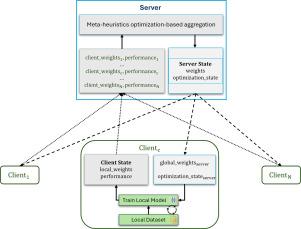Meta-heuristic federated learning aggregation methods for load forecasting
IF 9.6
Q1 COMPUTER SCIENCE, ARTIFICIAL INTELLIGENCE
引用次数: 0
Abstract
Federated learning (FL) is essential to energy transition as it leverages decentralized energy data and machine learning to collaborative train global energy predictive models across distributed energy resources while preserving data privacy. This paper introduces one of the first FL frameworks that efficiently integrates swarm intelligence-based aggregation methods to large-scale energy consumption forecasting, by extending the TensorFlow Federated Core framework with specialized functional enhancements. The primary objective is to enhance forecasting accuracy in decentralized learning settings. We investigated the effectiveness of various nature-inspired metaheuristics for optimizing the aggregation of local model updates from distributed energy resource nodes into a global model for load forecasting tasks, including Grey Wolf Optimization (GWO), Particle Swarm Optimization (PSO), and Firefly Algorithm (FFA) against the standard Federated Averaging (FedAvg) algorithm. Using a real-world dataset comprising of 4,438 distinct energy consumers, we demonstrate that metaheuristic aggregators consistently outperform the most well-known method, Federated Averaging in predictive accuracy. Among these approaches, GWO emerges as the superior performer achieving up to 23.6% error reduction. Our findings underscore the significant potential of metaheuristic-based aggregation mechanisms in improving FL outcomes, particularly in energy forecasting applications involving large-scale distributed data scenarios.

负荷预测的元启发式联合学习聚合方法
联邦学习(FL)对能源转型至关重要,因为它利用分散的能源数据和机器学习来跨分布式能源协作训练全球能源预测模型,同时保护数据隐私。本文介绍了第一个FL框架之一,该框架通过扩展TensorFlow联邦核心框架和专门的功能增强,有效地将基于群体智能的聚合方法集成到大规模能源消耗预测中。主要目标是提高分散学习环境下的预测准确性。我们研究了各种自然启发的元启发式算法,包括灰狼优化(GWO)、粒子群优化(PSO)和萤火虫算法(FFA)对标准联邦平均(FedAvg)算法的有效性,用于将分布式能源节点的局部模型更新聚合到负荷预测任务的全局模型中。使用包含4,438个不同能源消费者的真实数据集,我们证明了元启发式聚合器在预测准确性方面始终优于最知名的方法联邦平均。在这些方法中,GWO表现优异,实现了高达23.6%的错误减少。我们的研究结果强调了基于元启发式的聚合机制在改善FL结果方面的巨大潜力,特别是在涉及大规模分布式数据场景的能源预测应用中。
本文章由计算机程序翻译,如有差异,请以英文原文为准。
求助全文
约1分钟内获得全文
求助全文
来源期刊

Energy and AI
Engineering-Engineering (miscellaneous)
CiteScore
16.50
自引率
0.00%
发文量
64
审稿时长
56 days
 求助内容:
求助内容: 应助结果提醒方式:
应助结果提醒方式:


